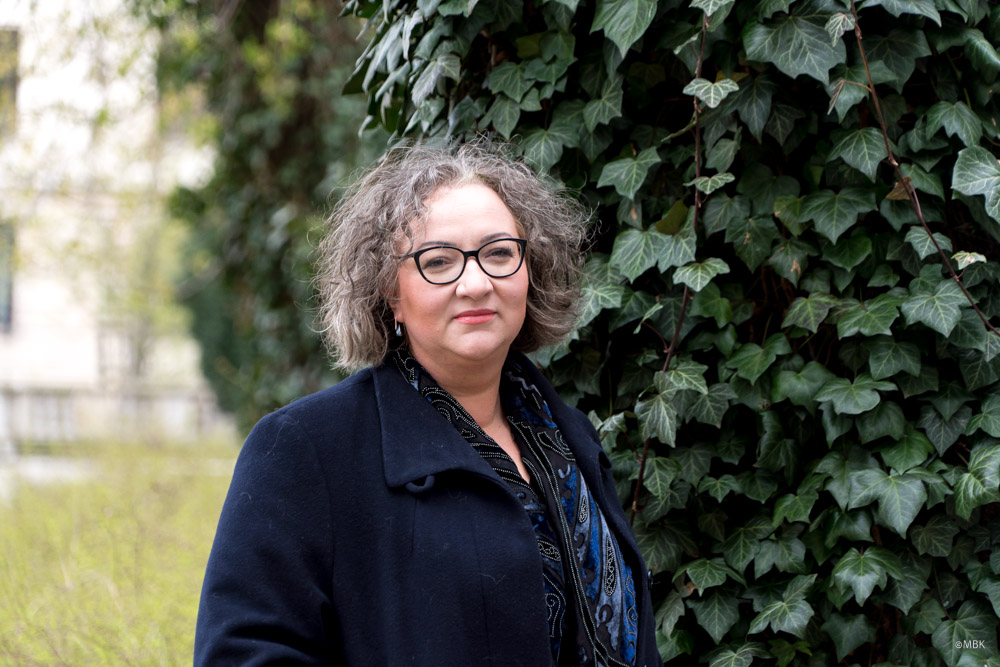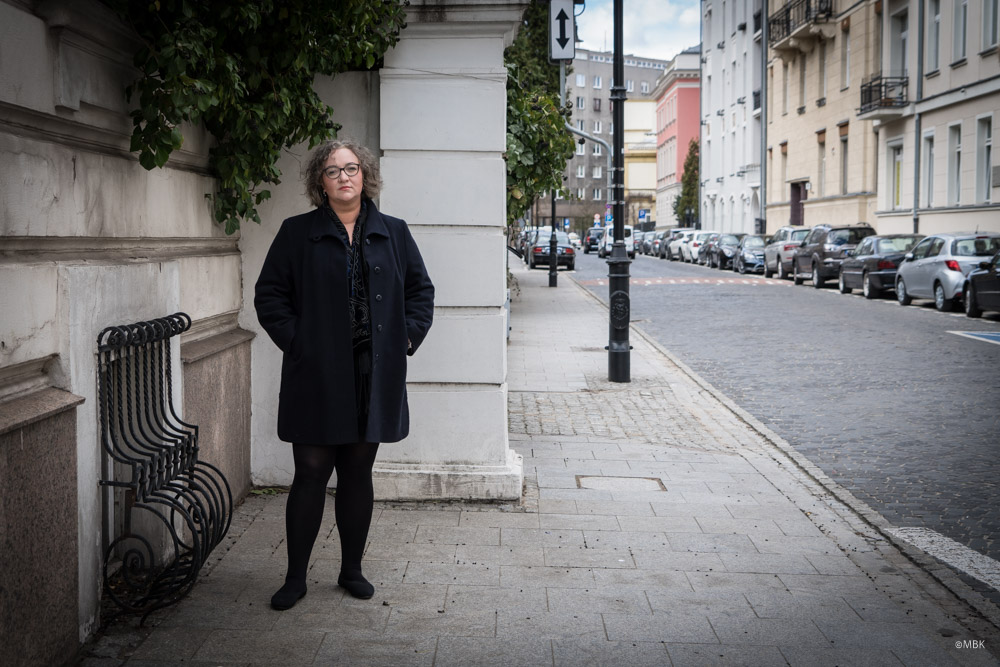
The right to a fair trial is no longer guaranteed in Poland. This is the clear message women’s rights defender Marta wants people to know.
‘“We can’t count on courts to be fair for long as the crackdown of the independent judiciary in Poland is happening at the maximum speed. The judges’ removals from the cases and replacements, based on political decisions of the ruling party are a daily occurrence. The government now aims for full power to decide which judge gets which case, taking over head positions in all possible courts.”
The activist and leader of the Women’s Strike has had 106 cases brought against her, most of which are pending because of the judicial reforms Poland has been told to take by the EU.
EU funding for Poland has been frozen for over a year as the country’s ruling ultra-conservative PiS government refused to roll back changes they made to the judiciary, which gives politicians more power to pick judges, as well as suspend judges for their rulings or for criticising the reforms.
The EU’s Court of Justice found Poland had broken EU law by appointing judges who were not independent. One of the prerequisites to receiving the EU funding was that the Disciplinary Chamber of the Supreme Court had to be disbanded and replaced with an impartial court, and suspensions against judges be reversed. The Polish government has set up a replacement Chamber but Marta remains sceptical insisting the government hasn’t restored the independence of the Polish judiciary.
”The milestones are not in compliance with the EU Court of Justice rulings on Poland so the EU undermines their own rule of law, choosing which ECJ measures are actually valid and which are not. It sends a clear message that they don’t care about the rule of law in Poland. There is an attempt now to fast-track cases against protesters before these new changes are implemented - and the European Commission's soft approach to Polish government's doings is to blame.
‘The government’s story is that it’s random selection but it’s not. Certain judges took over these positions in Warsaw as most cases against activists are located here. We will lose as a result.’
Cases were filed against Marta for organising protests at the height of the Covid-19 pandemic, charges which could amount to an eight-year prison sentence. In a case filed against her by Ordo Iuris, an ultra-conservative Christian organisation, the judge appointed to the case was replaced by another judge close to PiS. In her previous role at the Ministry of Justice, Kamila Spalińska was deputy director of the legislative department of the court system, the department in charge of rolling out the controversial reforms to the Polish judiciary, the ones Marta says have been condemned by the EU Court of Justice. In 2018, The PiS party nominated all member judges to a new judiciary council, of which Spalińska is a member of. Marta’s lawyers filed a motion to remove her from the case but it was denied.
Criminal cases tend to be brought more frequently against organisers but also participants of protests based on COVID regulations, traffic blocks or charged for hanging posters, as well as bogus claims like ‘destroying property’ and littering in public. If they can’t put you in jail, they want to cripple you financially, Marta says.
‘Misdemeanour fines can be hefty, legal fees are high and your freedom is curtailed. You are forced to stay in same city, register every week at the police station if there are more than two or three fines. It’s a huge financial burden. The punishment goes up for repeat offences and if you don’t pay the fines.’
It’s illegal to put funds aside to pay for protesters’ fines.
‘You cannot pay fines. We have a social fund to help people pay their bills if their financial situation gets worse because of activism. We have pro bono legal assistance and provide financial assistance to pay for activists’ legal fees.’
‘Hospitals are a nightmare for Polish women and they’re even worse for Ukrainian women.’
The Russian invasion of Ukraine has put a limit on the amount of work the movement can do, NGOs are relying on donations, volunteers and crowdfunding.
‘The government are using the war to showcase how humanitarian they are, at the same time passing off NGO work as their own and asking for money from the EU. It’s hard as we don’t get enough financial assistance, and we don’t have formal refugee and humanitarian experience.’
She says it’s a disaster for small organisations as they are outside the system and don’t get any support.
‘It’s sad as we didn’t have this civil engagement in 2015 and now people are so engaged and it’s slipping away. It’s being eaten by the war. We are back to a whole generation being terrified as we know what the Russians are capable of.’
Abortion without Borders provides 30% of all abortions performed in Poland. Marta says there is a lot of work to be done to inform Ukrainians that the service is there.
”We tend to kill pregnant people in our hospitals. There are pregnant Ukrainian women in hospitals who don’t speak Polish so we can’t protect them when they enter the healthcare system. Hospitals are a nightmare for Polish women and they’re even worse for Ukrainian women. If the pregnancy is because of a rape, you need a letter from the state prosecutor but how can they do that from Ukraine?
If they want to get Ukrainian women help outside of the Polish healthcare system, Marta says Abortion without Borders needs more funding to run an information campaign aimed at Ukrainian women.
‘We have unsafe abortions in hospitals not with Abortion without Borders. Winter means twice as many people are arriving. We need financial support for all CSOs. There aren’t that many refugee organisations so it is local CSOs carrying out most of the work.’
‘Without the Istanbul Convention, survivors are just a number’
Marta is resigned to the fact that they can only do 50% of their planned projects because of the war. This includes their ‘Friends/Neighbours’ project, which is run with local community leaders providing support to survivors of domestic violence.
Poland is on the verge of dropping out of the Istanbul Convention and funding has already been cut for gender-based violence survivors with centres now only located in big cities.
The pervasive pro-family narrative spouted by the Polish government and the Catholic church is centred on ‘tradition’ reinforcing the message that domestic violence is a family issue. The Istanbul Convention provides a framework for multisectoral cooperation and obliges signatories to provide protection and assistance for victims (known as the ‘Blue Card’ procedure).
”If the Convention is dropped, there will be no data collected. The Blue Card registry system means everything is documented on a database so you can see how many interventions there were. This makes it easier for survivors to fight the system.
Without this, Marta says survivors are just a number, one of thousands of police interventions and there would be no way to prove gender-based violence. She also adds that police often don’t bother registering the cases and they aren’t trained in dealing with gender-based violence victims.
‘When we were attacked that was the moment we became a movement.’

Women who participated in and organised pro-choice protests were being harassed at work, and priests were calling them murderers in church. Marta says it was a shock.
‘Many thought they could go home and get on with their lives but the awful reality was they were attacked. Initially women were quiet but when we were attacked that was the moment we became a movement.’
Marta credits much of their success to using relatable narratives about the day-to-day reality of women on the ground.
‘We didn’t talk about women’s rights or get on our high horse about human rights. It was about highlighting the hypocrisy of politicians and lies from the church. This convinced those who were against it because of religion. We said everybody knows this is happening, let’s stop pretending.’
The anti-establishment factor was very important to the Women’s Strike movement. It was a space for everyday people who knew that a total ban would mean an abortion would cost twice their monthly wage.
”It was about emphasising the inequalities and showing people that rich people and politicians have no problems getting abortions. It’s humiliating to struggle for money and to be afraid. We have always had to live without state support and fight for healthcare, education, and disability services. The vulnerable are always left behind. Now it’s worse as it’s openly a no. It’s fuelled by hate, done on purpose and not by negligence. As long as we keep telling people if they don’t succeed in life, it’s their fault, we will always have populist governments.
‘People are moving more towards love and not hate’
The majority of Polish people want liberalisation of abortion care which means that a small ultra-conservative elite is holding Polish citizens to ransom.
‘We have 97% support from the biggest opposition party and 94% support from the second opposition party electorate. The right-wing conservatives have declared they will vote yes, prior to the 2020 protests they were pro the abortion ban. Even the Pis electorate and the Neo Nazi party are at 52%,’ Marta says.
The major work going forward is to hold this support until the election. For Marta, the important thing is to highlight that fundamentalists care more about the church than the voters. Exposing this can shift voter support to those who listen.
There is no division between church and state in Poland and Marta is adamant that political leaders need to stop answering to the church and put people first. Young people in Poland are despondent as they feel underrepresented.
‘They ask why they should bother voting as the parties are all the same. There is no left-wing party in Poland, it’s all right-wing and conservative. We have to convince young people to vote. We will provide recommendations on all decent candidates from different parties in the 58 electoral regions.’
Marriage equality support in 2016 was at 18% and now it is at 52%. Abortion liberalisation support was at 37% in 2016 and it is now at 70%. She is hopeful about the election but acknowledges the measure will be in how many supporters show up to vote.
”Moderate conservatism has been hijacked but PiS are destroying themselves. People saw the violence we faced. There has been a huge wave of support from people who don’t want to be part of the anti-women and anti-LGBT+ campaigns. They are too dogmatic, there must be a middle ground. People are moving more towards love and not hate.
Story by Dearbhla Crosse.
Photography by Marta Bogdanowicz.
